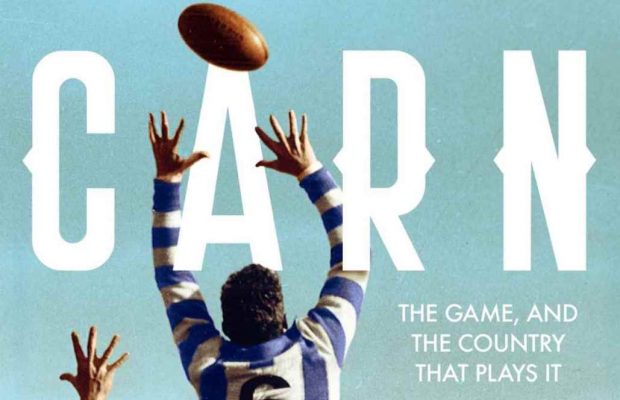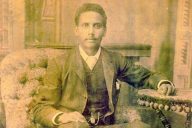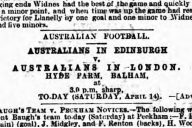In 1896, football in the colony of Victoria was in crisis. Australian Rules football as played in Melbourne had become unwatchable and turned into box office poison.
A decade old law which allowed for “little marks” to be awarded for kicks travelling a distance of two yards was being abused by teams keen to gain a winning advantage. Long kicking was in decline as keeping possession in a moving ruck became the go to tactic.
A game which had in the 1880s evolved into a crowd pulling expansive game, and led to its move from the rectangular paddock to the enclosed admission charging cricket oval, had regressed into a barbaric stop start affair that was almost impossible to officiate. As a result it was not uncommon to see frustrations boil over on and off the playing field.
The low point of the 1896 season was plumbed at Arden Street where umpire Roberts was assaulted by a mob of furious North Melbourne barrackers. Only the brave actions of a few players, who were injured in their efforts to protect him, saved him from very serious harm.
Writing in The Age to announce the opening of the 1897 football season, “Follower” described the unsatisfactory state of affairs in no uncertain terms.
Melbourne and suburbs can bestow treble the amount of patronage on football that the game has enjoyed during the last couple of seasons, and if it be well played and creditably conducted that patronage which was withdrawn will doubtless be revived. The people have shown in the past that they love the game, but there is a limit to human forbearance, and it must candidly be said that the degradation of football in Victoria was the reprehensible work of those by whom it was played and mismanaged.
1897 was a watershed year. Two decades of Victoria’s premier football competition run under the auspices of the Victoria Football Association was usurped by the breakaway Victorian Football League. The VFL was comprised of bigger clubs fed up with sharing the gate receipts with clubs who struggled to draw a crowd. But size wasn’t the only consideration. Clubs like Port Melbourne and North Melbourne, who merited inclusion based on their playing records and their formidable support, were excluded mainly on the grounds that their support was, to put it politely, formidably inhospitable. North was belatedly invited back into the VFL fold in 1925, Port’s exclusion was permanent.
The inaugural VFL season kicked off on May 8, 1897 with eight teams. Carlton, Collingwood, Essendon, Fitzroy, Geelong, Melbourne, South Melbourne and the runt of the litter St.Kilda (who, generous in their mediocrity, lost their first 48 VFL games). Crucial reforms were introduced to make the game a more attractive spectacle and bring back the crowds. “Little Marks” were abolished. Under the new law a ball had to be kicked a minimum of 10 yards for a mark to be awarded. The scoring system was overhauled to reduce the number of drawn games. Behinds which had been counted, but never scored, were finally given a value of one point. A goal was given a value of 6 points. The winner of the game was no longer the team that scored the most goals but scored the most points.
The first round of the first VFL season, more specifically the match between Geelong and Essendon, is also the embarkation point for Andrew Mueller’s Carn: The Game and The Country that Plays it. Mueller makes no apologies in neglecting pre-VFL history as this was not his raison d’etre for writing the book. This is no Geoffrey Blaineyesque attempt at the Origin of the Football Code Species. Instead, Carn is an unconventional rollicking history of Australian Rules football seen strictly through the lens of the country’s dominant football league.
Like a modern day H.G Wells, London based but Wagga Wagga born, Mueller has jumped into his time machine and set the controls to arrive at 57 noteworthy VFL cum AFL (Australian Football League) matches spanning 120 years.
Following his advice I abandoned reading the book in chronological order and headed straight to the games that punched my memory buttons like Phil Carmen’s famous head butt on boundary umpire Carbery, Malcolm Blight’s supernatural game winning torpedo, Fitzroy’s last ever game and Nicky Winmar’s making his iconic point to the racist mob at Victoria Park.
Older readers will revel in the nostalgia of the adventure that was visiting the rougher and readier suburban VFL footy grounds of times past, when playing at your home ground actually meant actually playing at your home ground. In my case, it was the long lost psychogeographic pleasure of yelling “Carn the Bombers!” under the scoreboard at Windy Hill.
Mueller generously sprinkles his book with enjoyable anecdotes and factoids. Like the Greek Australian who became the first player to make it to 100 VFL games and the story behind “Up There Cazaly!”, the unlikely saying that travelled the world before becoming footy’s most famous song.
Another highlight was the bizarre story of Charles Cozen Spencer, the man who captured the earliest footage of an Australian Rules match otherwise known as the 1909 VFL Grand Final. In 1930, he was found drowned in a river after he went on the run after inexplicably shooting the two men, killing one and wounding the other, who were helping him unload the groceries on his Canadian ranch.
“Everything I know about morality and the obligations of men, I owe it to football,” said everybody’s favourite existential goalkeeper Albert Camus. But it also applies to the Antipodean code. All the flavours of the human condition are sampled in Carn and for me this is the greatest strength of the book.
The most poignant match in Carn features two remarkable men who define humanity’s capacity for good. Footy fate brought together Sir Doug Nicholls of Fitzroy and Peter Chitty of St.Kilda all but briefly together in Round 11 of the 1936 season.
Most footy fans know the story of Doug Nicholls, the champion Indigenous footballer and athlete who selflessly fought with dignity and grace to improve the lot of his fellow dispossessed disenfranchised people. Playing gamely on the wing against him that day was debutant Peter Chitty whose budding VFL career lasted a grand total two games after a workplace accident broke his leg.
Six years later we find Peter Chitty winning the Changi Brownlow medal as best afield in the Victoria v The Rest match played in front of 10,000 fellow prisoners of war. Peter then survives the privations of the eighteen months of hell that was Burma Railway during which he routinely nursed, carried and protected men struggling with exhaustion and disease. He even carried a drunken Japanese guard 15km back to his camp to save him what would have been martial punishment.
Later in Carn we find our heroic survivor of hell, Peter Chitty, in Darwin listening to the 1945 VFL Grand Final, between Carlton and South Melbourne, as he is awaiting repatriation to Melbourne. He lost a brother at El Alamein. Three more were taken prisoner. But on the radio, a brother who didn’t go to war, Carlton Captain Bob Chitty, is playing a leading role as one of the meanest villains in the “macho psychodrama” otherwise known as “The Bloodbath” or “the most repugnant spectacle football has ever known.”
Over 60,000 football fans squeezed into Princes Park, many were khaki clad returnees from real life and death battles. What was going through Bob Chitty’s mind? Did he and other players feel emasculated by their presence? Did they have to act out a series of violent, senseless, cowardly acts on the field to show the warriors in the crowd that they were warriors too?
By the time I digested all of Mueller’s loquacious degustation meal of 57 tasty matches I came to the satiated realisation that Carn is the story of a football league, that like The Blob, swallowed an entire code. Where “Australia’s Game” is no longer known as Australia Rules football but simply by three letters, AFL.
Admirably Mueller also doesn’t shirk from describing the fan violence which afflicted the game in late 19th and early 20th centuries and serious incidents of on field violence which carried on until the late 20th century. When it comes to the age old complaint from footy fans that thing were much better back in the day, Mueller reminds us that in many cases it was worse, much worse.
Carn ends in Round 8 of the 2017 season with the incongruous sight of Port Adelaide hosting the home team Gold Coast in an empty stadium in of all places Shanghai. Yes, it might have been worse back in the day, but sometimes it was also better.
Carn: The Game and The Country that Plays it by Andrew Mueller is published by Harper Collins and is available online and at all good bookstores.
















